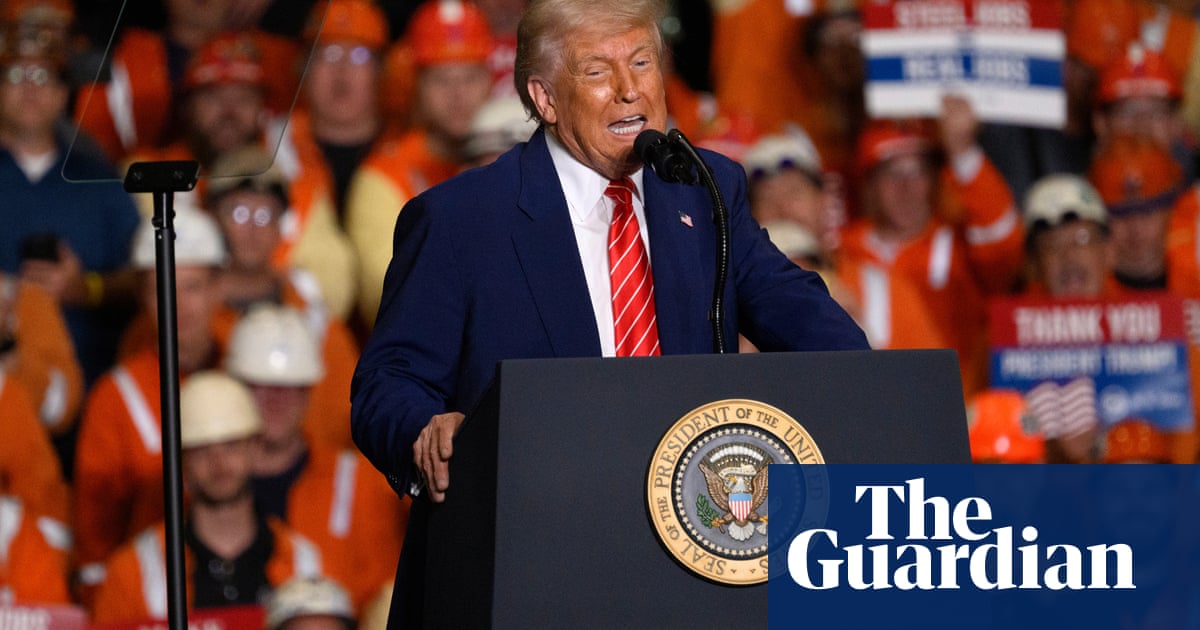Australia’s trade minister, Don Farrell, has described Donald Trump’s trade tariffs as “unjustified and not the act of a friend”, after the US president announced he would double import duties on steel and aluminium to 50%.
Trump told a steelworkers rally in Pittsburgh that raising the tariff would “even further secure the steel industry in the United States. Nobody is going to get around that”.
In a social media post on Saturday, Trump clarified the increase from 25% to 50% would be effective from 4 June and would apply to steel and aluminium.
Australia exports relatively little steel to the US. About 2.5% of US aluminium imports by volume come from Australia, but this is less than 10% of Australia’s total exports of the metal.
Reiterating Australia’s stance on the tariffs, Farrell said on Saturday: “Australia’s position has been consistent and clear. These tariffs are unjustified and not the act of a friend.
“They are an act of economic self-harm that will only hurt consumers and businesses who rely on free and fair trade. We will continue to engage and advocate strongly for the removal of the tariffs.”
The shadow trade minister, Kevin Hogan, said on Saturday that Trump’s announcement was concerning for Australian jobs.
“The Albanese government needs to double its efforts to protect our steel industry and local jobs for our steelworkers,” he said.
“We expect the United States to honour its obligations under the Australia-United States Free Trade Agreement, just as Australia has always done. The strength of our economic partnership has been built on trust and mutual benefit, and any deviation from this agreement undermines the principles of free trade.”
Hogan said the prime minister, Anthony Albanese, needed to personally meet Trump during the G7 talks in Canada taking place in two weeks “to develop a personal rapport with the United States president and protect Australian industries”.
Hogan said: “The Coalition want the government to succeed because that is in the national interest.”
Trump’s sweeping tariffs were initially blocked by a US court this week, which ruled them illegal, before the administration won a temporary pause on that ruling on Thursday.
It is understood a national security provision – section 232 of the Trade Expansion Act – does give the US president authority to unilaterally raise tariffs on steel and aluminium imports.
Marghanita Johnson, the chief executive of the Australian Aluminium Council, said a key concern was the potential for international trade flows to be distorted. The council would keep working with the government, she said.
after newsletter promotion
Mark Cain, the chief executive of industry group the Australian Steel Institute, said the increase in tariffs was disappointing.
He said: “One of the concerns we have is that the subsequent disruptions to global steel trade could see Australia become a dumping ground for imported steel. And it could exacerbate the surge in imported low-priced steel that is damaging the industry.”
In March, when the steel tariffs came into force, BlueScope Steel, which exports about 300,000 tonnes of steel a year to the US, said it was disappointed the industry had not received the same tariff exemption that was negotiated during Trump’s first term. The company produces more than 3m tonnes of steel each year at its Ohio plant.
BlueScope said at the time it was working closely with the Australian government’s trade and diplomatic staff “to ensure the BlueScope investment proposition is fully understood”.
Australian economist Prof Justin Wolfers, of the University of Michigan, told Guardian Australia the steel tariffs would probably have little effect on Australian industry, as demand for steel globally should allow companies to find other customers.
He said: “We are talking about very small numbers of people [who work in the steel industry in the US]. But steel is used as an input for a broad array of manufacturing jobs. Steel will be more expensive – even American steel.”
Wolfers pointed to previous analysis of the impact of 2018 steel tariffs during the first Trump administration, which found they created about 1,000 more steel jobs but about 75,000 jobs were lost from the wider manufacturing sector.
Asked why Trump was implementing the increase, Wolfers said: “There are some questions better directed to a psychologist than an economist. Trump likes tariffs.”









